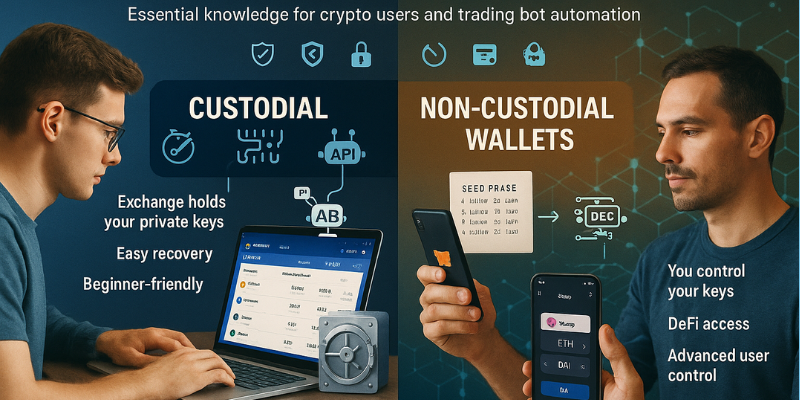Getting started in crypto means learning new terms and one of the most important is the crypto wallet. Whether you’re buying Bitcoin, experimenting with crypto trading bots, or diving into automated crypto trading, you’ll need a secure place to store your digital assets.
So what is a crypto wallet, exactly? And how do custodial vs. non-custodial wallets differ? Let’s explore and see how it all connects back to crypto trading strategies and tools like trade bots.
What is a crypto wallet?
A crypto wallet is a software program that helps you securely manage your cryptocurrencies, tokens, and digital assets. It doesn’t “hold” your coins physically like a traditional wallet. Instead, it stores your private key – the cryptographic proof that allows you to access and control your funds on the blockchain.
A crypto wallet allows you to:
✅ Send and receive cryptocurrency
✅ View your account balances
✅ Connect to crypto exchanges and apps
✅ Let bots trade crypto or run automated trading strategies
There are different wallet types—hardware wallets, software wallets, web wallets, mobile wallets—but the most crucial distinction is custodial vs. non-custodial wallets.
What is a custodial wallet?
A custodial wallet means a third party (like a crypto exchange) holds your private keys for you. Think of it like money in a bank you can use it, but ultimately, the bank is in control.
Features of custodial wallets
- Extremely user-friendly, great for beginners
- Recover your account if you lose your password
- Often built directly into crypto trading platforms
Examples of custodial wallets
- Binance Wallet
- Coinbase Wallet (custodial mode)
- Crypto.com App
Benefits of custodial wallets
✅ Simple and beginner-friendly
✅ Easy integration with crypto trading platforms and bots
✅ No need to manage private keys
Drawbacks of custodial wallets
❌ You don’t technically “own” your crypto—the custodian does
❌ Accounts can be frozen due to regulations or compliance checks
❌ Less privacy and autonomy
Note for bot users: Most crypto trading bots and cryptobots connect seamlessly to custodial exchanges via APIs, making them an easy option for automated crypto trading.
What is a non-custodial wallet?
A non-custodial wallet puts you in full control of your crypto. You hold your private keys, and with them, true ownership of your assets. The crypto community often says, “Not your keys, not your coins.”
Features of non-custodial wallets
- You control and store your private keys
- No third-party can freeze or confiscate your funds
- Essential for accessing decentralized apps (dApps) and decentralized exchanges (DEXs)
Types of non-custodial wallets
- MetaMask
- Trust Wallet
- Ledger hardware wallet
Advantages of non-custodial wallets
✅ Full control and ownership of your crypto
✅ Greater privacy and security
✅ Access to DEXs, DeFi protocols, and advanced crypto trading strategies
Cons of non-custodial wallets
❌ Lose your private keys or seed phrase, and your crypto is permanently lost
❌ More complex for newcomers to use
Note for bot users: Many crypto trading bots operating on DEXs or engaging in on-chain trading use non-custodial wallets for signing transactions. When running automated strategies on decentralized platforms, non-custodial wallets are the standard.

Custodial vs. non-custodial wallets: What should you use?
Choosing between custodial and non-custodial wallets depends on your goals as a crypto user:
- Recreational trader? A custodial wallet is convenient, user-friendly, and integrates easily with crypto exchanges and trader bots for automated trading.
- Advanced user? A non-custodial wallet is vital for accessing DeFi, DEXs, and newer tokens, and it’s ideal for custom crypto trading strategies.
- Automated crypto trading? Custodial platforms simplify bot integration, but sophisticated bots exist for non-custodial wallets, especially for DeFi trading.
Final thoughts
A crypto wallet is much more than a place to “store” coins. It’s your gateway to everything from basic transactions to advanced, automated crypto trading with crypto trading bots. Understanding the differences between custodial and non-custodial wallets empowers you to:
✅ Keep your crypto safe
✅ Select the right tools for your trading strategies
✅ Choose the level of control you want over your funds
Whether you’re investing in Bitcoin for the long term or running a cryptobot on a crypto exchange, choosing the right wallet is your first crucial step into the world of crypto.

